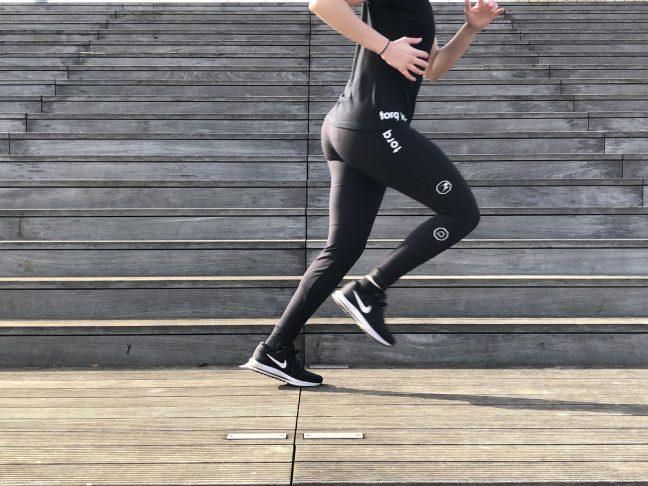Models wearing University of Wisconsin graduates’ high-tech clothing walked the runway of the Avantex French trade show in mid-February.
The clothing is the product of Torq Labs — a startup with five of its six founders graduating from UW — and has found success at the show in the past, winning a grand prize at the show’s fashion-tech pitch contest in September.
Co-founder of Torq Labs Julian Holtzman said the company’s leggings track the wearer’s running movements using sensors tucked around the knee to help prevent lower-body injury. The data then flows to a smartphone application where it is analyzed for bad gait performance, like misalignment, imbalance or movement asymmetries.
“People don’t know they’re doing something wrong until they start to feel it and then they stop,” Holtzman said. “If we can help them before then, then we’re succeeding.”
Cara Wells of the Chicago Red Stars and Japheth Kato, a heptathlete at UW, are currently testing the technology, according to Torq Labs’ website.
Holtzman said David Bell, the director of the Wisconsin Injury in Sport Laboratory at UW, “helped validate [the company’s] entire idea” as an advisor and reference point in the early days of the startup’s founding in 2015.
Torq Labs used Bell’s systems for monitoring and measuring gait to compare their own early prototypes, Holtzman said. Once the data coming from the two systems matched, Holtzman said he and the other co-founders knew their technology would translate in the real world outside of the laboratory.
Though studying the gait of someone running on a treadmill in a laboratory is precise, it doesn’t translate accurately to what it is like to run in real environments, like the hard surfaces of a sidewalk or the synthetic material of a competition track, Holtzman said
“We can now sort of readapt the science,” Holtzman said of Torq Labs’ leggings. “We can now take the clinic into the environment and look at how things change in the environmental setting.”
Having majored in philosophy and environmental science and obtained Master’s Degrees in public administration and public health. Holtzman said he does not have a kinesiology or tech background, but UW provided a way to seek out people who could fill the gaps in his knowledge.
UW’s status as a large research institution was instrumental in the creation and success of Torq Labs because it contained accessible and helpful research labs and faculty, like Bell and his movements lab. The university also created a culture for people of different backgrounds to interact, Holtzman said.
Holtzman said founding Torq Labs was like constructing a recipe where he asked himself what ingredients needed to be added to the company for it to succeed.
“You start to come up with the questions and the university is like a library of people,” Holtzmann said.
Dan Olszewski said in his 12 years as director of the Weinart Center for Entrepreneurship at UW, Madison has “blossomed” as a hub for new businesses, with rapidly growing numbers of startups, many of which UW students founded.
While Madison is attractive as a home for businesses because of its low cost of living compared to places like San Francisco, Boston or New York, Olszewski said the UW itself is a major force in the creation of new companies since it provides a fertile ground for startups like Torq Labs to grow.
“The university is a real big engine for entrepreneurship because of all the students and ideas that are being created, either in the lab or just having this many bright people that are thinking about solving problems,” Olszewski said.
As the professor of the Weinert Applied Ventures in Entrepreneurship class, Olszewski said he witnesses entrepreneurs’ “eclectic” ideas every semester.
Students form teams in the class, develop an idea and then learn how to flesh out and de-risk the idea into a business, Olszewski said. Unique to WAVE, the class has a small investment fund attached to it which allows faculty to invest in startups that come out of the class, Olszewski said.
Olszewski said one startup that has stuck with him the most over his time teaching the class is called Understory, a “backyard weather station” a graduate student in atmospheric sciences created. This station records weather data like temperature, barometric pressure, wind and most importantly hail impact.
Almost immediately after a hailstorm, fraudulent roof contractors will show up on the doorsteps of homeowners telling them their roof is damaged and needs to be repaired, Olszewski said. But because hail is hyper-localized, Understory’s weather stations can accurately and quickly tell whether the contractor’s claims are true or not.
“Its a multi-billion dollar a year problem for insurance companies,” Olszewski said. “So having this data of knowing where do we really need to replace these roofs and where is it not a real issue is important.”
Olszewski said Understory went on to raise around $10 million in venture capital and remains centered in Madison.
Torq Labs’ founders currently operate their company out of a startup incubator far removed from the UW campus.
Station F, a warehouse spanning more than 100,000 square feet with room to house more than 1,000 startups, lays in a former rail freight depot in Paris. Alongside Torq Labs sit startups from established companies like Google and Facebook and smaller companies, like one that sells flip-flops, Holtzman said.
But despite being in Paris — which Holtzman said feels like Washington D.C. and New York City combined — and working alongside 100s of other startups, Station F reminds him of UW, Holtzman said.
“You’re in close proximity to everybody and everyone is working on different stuff, which in the same sort of way is like university,” Holtzman said.


